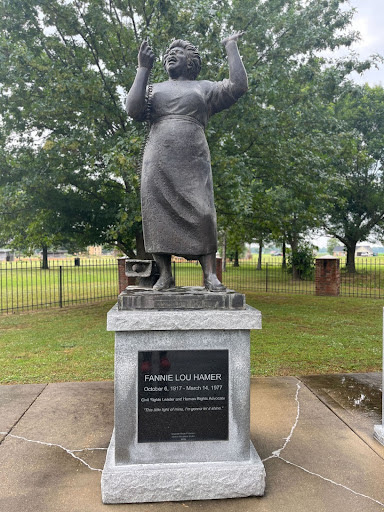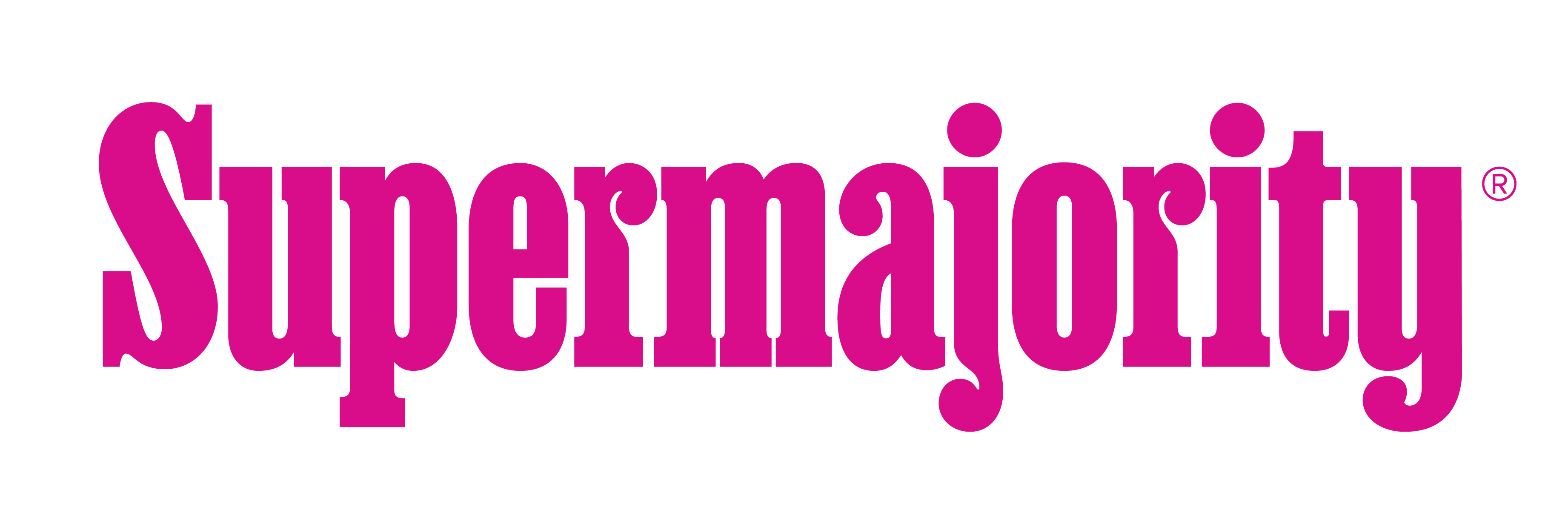WELCOME BACK. TODAY IS FRIDAY, JULY 7.
Today’s newsletter is brought to you by Jara Butler, Supermajority’s chief impact officer. Jara directs all of our programmatic work by supporting the strategy of the Communications, Creative, and Digital and Strategic Programs teams. She measures our external impact, ensuring our work is both meaningful and changemaking and that it aligns with Supermajority’s mission, vision, and values.
Hi folks! I’m Jara (she/her), and I’m excited to be chatting with y’all today. I was about four years old when I heard my granny tell my mom, “That girl is gonna be an old politician.” In our tradition, my granny spoke both power and purpose into my life, whether she knew or she felt it. One does not argue with Granny, so here I am, more than 30 years later doing the thing I feel I was called to do — being part of a community committed to creating a world we want from the world we have been given.
Two things brought me into this work: being a Texan and being a union kid. I’m a working class kid from a once-rural town in northeast Texas who grew up having Ann Richards and Barbara Jordan on my television screen. I also spent most of my childhood around labor organizers, knocking on doors with my dad for people like Jesse Jackson. I saw a world in Texas that was unequal, unfair, and unjust. I think at one point, I wrote a paper in sixth grade about how one day I would be governor of Texas. That essay may have terrified my teacher. And like the Virgo I am, I had a detailed proposal of what I would change, how I would pay for it, and also a campaign plan that I’m sure said “just win.”
At my core, I am an organizer. I am a devotee of Fannie Lou Hamer, because I do believe liberation is for us all. If I liberate myself, I liberate you too. If I am going to fall, I’m falling forward. Nothing in this country has changed without the people rising up to make it happen. And we do that by organizing.

And I feel that now even more passionately. It’s easy to feel the weight of despair in this moment. The world is literally on fire, and we are the first generation to witness our freedoms erode. We are watching unelected judges, who used the ladder created by the Civil Rights Movement to ascend to heights undreamed of at one time, gleefully yank that ladder for future generations because “ideology.” It’s so easy to give in, but I believe hope is the most powerful thing we have in this world. As long as there is hope, there is power, and where there is power therein lies the will to create a nation of the people, for the people, and governed by the people.
Here’s what you’ll find in today’s biweekly newsletter: a summary of the latest Supreme Court rulings, how you can take action in response, and what’s bringing me joy.
Before we jump in, a quick note: Don’t expect any more Supreme Court cases until this fall; this recap is the last of them for this season. Please know these rulings are the continued consequences of the 2016 election. Your vote is important — don’t take it for granted.
Let’s get started:
THE CASE OF THE HYPOTHETICAL WEBSITE
A Colorado web designer sued the state, claiming that its anti-discrimination act forced her to go against her religious beliefs by not allowing her to use her First Amendment right and post a notice on her would-be business’s website stating that she won’t design websites for same-sex marriages. This case went to the Supreme Court over a hypothetical scenario (that’s right, she was never actually asked to make a website for any couple, and most certainly not for a same-sex couple). This past Friday, in a 6-3 ruling, the Supreme Court sided with the web designer and ruled that businesses can legally discriminate against and refuse services to LGBTQIA+ folks. Although the ruling is limited, it marks a significant loss of anti-discrimination protection and sets precedent for further stripping of civil rights law.
Now, let’s take a step back and discuss how this decision connects to women voters. Gen Z and Millennials have the largest share of LGBTQIA+ voters respectively. More than 16 million young people have turned or will turn 18 between the previous general election in November 2020 and the 2024 election.
That’s 4,320,000 newly eligible, young LGBTQIA+ voters. Gen Z and younger Millennial LGBTQIA+ women are also more likely to vote for a candidate who talks about and stands up for the issues they care about. This decision has the opportunity to shape next year’s election in crucial ways — and, of course, we’ll be keeping you up to date on this issue.
NO STUDENT LOAN FORGIVENESS — FOR NOW
As a response to the 6-3 Supreme Court ruling last Friday that blocked President Biden’s student loan relief plan for some 40 million Americans, Biden has already announced new plans that may still make student loan forgiveness a reality. In typical fashion, the result of the court’s decision will overwhelmingly affect young women, who are already struggling financially (only a quarter of women ages 18 to 25 are living comfortably). And it is Black women who will face the greatest pressure; Black women are among the highest educated population in the country but also hold the greatest amount of loan debt, a reality that is compounded by wage disparities once they graduate.
Biden intends to implement a one-year suspension of actions against borrowers who fall behind on payments. There will also be the possibility of relief for cash-strapped borrowers in danger of becoming late or defaulting on payments. In addition, the Education Department won’t refer folks who miss payments, make partial payments, or make late payments to collection agencies during the 12-month transitional period from Oct. 1, 2023 to Sept. 30, 2024.
AFFIRMATIVE ACTION FACT CHECK
Since it was first brought to the Supreme Court in 1978, colleges and universities have been allowed to consider the race of applicants when making admissions decisions. This 45-year legal precedent was reversed last Thursday when the Supreme Court ruled against affirmative action policies, banning race-conscious admissions policies at the University of North Carolina and Harvard College.
Make no mistake, this narrow decision reverses hard-fought progress for young people, marginalized communities of color, and women — and it’s all a desperate attempt to maintain power. The decision is already affecting students making college application decisions and will likely most severely harm students identifying as Hispanic, Native American, Black, and multiracial.
Contrary to popular belief, white women — who claimed they were denied higher education admission because of their race — benefit the most from affirmative action. Affirmative action is a set of policies aimed at creating more equal opportunities in application processes. The policies often factor in race, but they can use a variety of identities such as sex, gender, income, and disability status. Affirmative action programs help to make universities and businesses more diverse and more reflective of our country as a whole. The opposition in this case argued that considering race violates the 14th Amendment’s equal protection clause because it purportedly disadvantages white and Asian-American students, but that’s not true.
A 2019 study of Harvard admissions found that 43 percent of white students are only admitted because they have legacy connections, their parents are major donors, or they are student athletes. Not because of merit qualifications. They would have been rejected otherwise, which means these are the largest factors in preferential admissions policies. TLDR; Race is an important, critical lens in college admissions decisions, and the Supreme Court did a disservice to people of color and women who may be passed over without affirmative action.
OUR BODIES ARE RESPECTED
I hope reading about the rulings in these cases has inspired you to take some action. Women need to take their anger, their hope, and their power straight to the ballot box in 2024 — and Supermajority will be alongside you every step of the way.
Want to act now? Supermajority Ed Fund’s Majority Leaders Speaker Series is having its second session, next Wednesday, July 12 at 8 p.m. ET. During this session you’ll hear directly from organizers at SisterSong, Lillian’s List, and the National Network of Abortion Funds who continue to carve the way and organize for reproductive freedom in the wake of past and upcoming efforts to restrict our freedoms.
If you’re ready to learn how you can use your own personal resources to support abortion access, then register now. I hope to see you there.
MY WEEKEND READS + LISTENS
WHAT’S BEEN BRINGING ME JOY
- Books! I am finishing up a great book on Frances Perkins — highly recommend.
- I was recently selected to join the University of Georgia School of Public and International Affairs Board of Directors.
- Beyoncé and football season.
Thanks for reading—you’ll hear from another staff member in two weeks.
Jara

Jake Butler (she/her)
Chief Impact Officer



